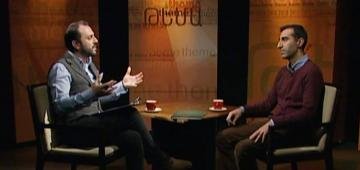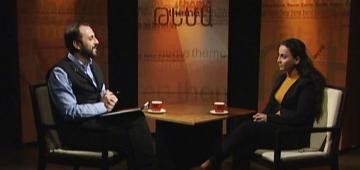Author and host: HaykHambardzumyan
TOPIC hosts men of culture, clergymen, renowned filmmakers and actors, Armenian and foreign scientists, scholars of Armenian studies, young specialists, writers and journalists residing in and outside Armenia.
How much do the contemporary Armenian art and literature relate to the development trends of world art? What new Armenian studies are currently underway in Armenia and Diaspora? Does the modern art educate or it rather entertains? These and other questions are voiced and answered in the pavilion of TOPIC.
Frequency: Every Friday, at 21:50
Rerun: Saturday, at 13:30
 |
Prospects of Reforms in Higher Education
How is it possible to implement reforms in universities considering current opportunities in Armenia, who can initiate and implement those? What is the role of the state in this case? How does higher education change in the world in general, and it is possible to keep abreast with these developments?
Hayk Hambardzumyan talked about these issues with Ruben Topchyan, Director of the National Center for Professional Education Quality Assurance Foundation.
|
 |
History of the First Republic: from Distortion of Facts to Academic Research
The research of the history of the First Armenian Republic has gone through several stages of development. Depending on the political agenda, the availability of archival materials, and the political and scientific orientation of the researchers, it has been presented differently at different times, which has affected the formation of public perceptions on the Republic of Armenia.
What and how do we know about this important period of the Armenian history, to what extent and how has the history of post-independence period impact the history of the First Republic?
Hayk Hambardzumyan discussed these issues with historian Hamo Sukiasyan.
|
 |
Network Movement
The national movement evolving in Armenia has not yet been settled, however it is obvious that it is new and exclusive in terms of its scope, the means used, the marking system and its impact. What is “network movement”, how did it emerge and what distinguishing marks does it have from similar previous movements?
Hayk Hambardzumyan discussed these issues with ethnographer Mkhitar Gabrielyan.
|
 |
Numismatics
Numismatics is the art of making money and medals, which owes its origin and development to the creation of coins. The medals with embossed portrait of Tigran the Great is well-known to us. The very first Armenian medals were created in the 17th century in key Armenian communities – Holland, Venice. At present, the art of meal making, though with little coverage, is still developing in Armenia.
Hayk Hambardzumyan spoke with sculptor Gurgen Hakobyan on the peculiarities of the Armenian numismatics, and on the overall problems of modern sculpture.
|
 |
30th Anniversary of Karabakh Movement
Theatre Square, rallies of thousands, fists in the air, a wonderous national spirit, and the trumpet ringing loud above all these with the call "Armenians, Join". This year marks the 30th anniversary of the Karabakh Movement. A movement which laid the grounds for the newest stage of our nation's history. That movement, which course, goals and outcomes seem to be known, yet many issues still need to be studied and clarified.
Hayk Hambardzumyan spoke about the nature and significance of Karabakh movement with ethnographer Harutyun Marutyan.
|
 |
Genocide Studies and Politics
Today, as we speak about the Armenian Genocide, first of all its political component, that being its international recognition, adoption of laws against denial, etc become vital. At the same time, in the public consciousness the solution of these issues is in the first play connected with the international political agenda and relations with Turkey. This is natural since genocide is a political crime. However, the genocide studies is much less addressed, which had and still has important role in the international recognition of the genocide and the prevention of similar crimes.
Hayk Hambardzumyan spoke about the problems, directions and significance of modern genocide with genocide expert Suren Manukyan.
|
 |
The Sacrament of the Holy Resurrection in Our Lives
“Christ has risen; He is risen, indeed”. This is the greeting heard across all Armenian Apostolic Churches today. The Candlelight Divine Liturgy of the Holy Resurrection signals the end of the Holy Week symbolizing the last days and works of Jesus Christ on the earth. This week is of a special importance for all believers and especially those fasting. Hayk Hambardzumyan talks about the the Holy Week and the sacrament of the Feaast of Holy Resurrection with Father Nshan Alaverdyan.
Hayk Hambardzumyan spoke with film director Khane Poghosyan.
|
 |
The Prospects and Barriers of Film Production
Filmmakers are loud about the lack of a unique Armenian cinema and the need to create it. In what ways should the promotion of Armenian cinema be driven, how can Armenian film industry become more interesting for investors, why isn’t a film development program in place?
Hayk Hambardzumyan spoke about these issues with producer Melik Karapetyan.
|
 |
Modern Museum: Why and How
In the modern world, the perception of the museum is also changing. They are not perceived merely as a place of preservation, display and study of historical and cultural exhibits, but also predent for much greater social and cultural functioning. How justified is this approach? How close to what extent are the museums in Armenia ready and open to changes, and what is needed for the development of museums?
Hayk Hambardzumyan spoke about these issues with the Director of Charents Museum of Literature and Art Karo Vardanyan.
|
 |
Armenian Language - Regulated and Free from Rules
Numerous practical problems in the use of modern Armenian language in terminology, literacy, orthography, verbal, punctual, oral and written Armenian are always subject to discussions and disputes. The "Supreme Council of Armenian Language" was established to discuss, coordinate, and consult these issues. How is the board to carry out this work, what functions does it have, and through what means and levers are language-related decisions will come into life?
Hayk Hambardzumyan talked about these issues with Yuri Avetisyan, Head of the Chair of Armenian Language at YSU, Doctor of Philological Sciences.
|
 |
Woman and Poetry
What are the characteristics of women's poetry, how justified is the distinction between the poem of a man and a woman? What does the Armenian reader expect from modern poetry and how much does the modern Armenian poetry touch upon the reader's concerns?
Hayk Hambardzumyan talked to poetess Nona Poghosyan about these issues.
|
 |
Youth TV Channel
Although young people are constantly part of film-related events, involved in the film festivals in Armenia, however, just like in almost every field, young people have fewer opportunities to realize their projects, receive state funding and compete with elders.
Hayk Hambardzumyan spoke with film director Khane Poghosyan.
|